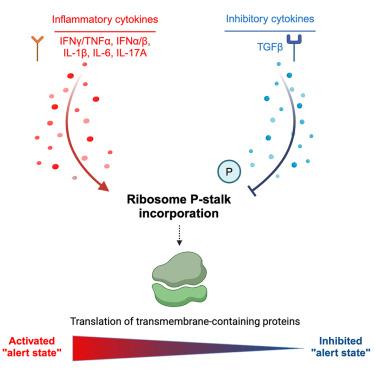P-stalk 核糖体是细胞因子介导过程的主调节器
IF 45.5
1区 生物学
Q1 BIOCHEMISTRY & MOLECULAR BIOLOGY
引用次数: 0
摘要
炎性细胞因子对免疫反应至关重要。细胞因子暴露后,细胞会进入一种 "警戒状态",这种状态会提高细胞在免疫系统中的可见度。在这里,我们发现了一种警戒状态的核糖体亚群,其定义是 P-茎的存在。我们发现,P-茎核糖体(PSRs)的形成是对与肿瘤免疫相关的细胞因子的反应,而这至少部分是由 P-茎磷酸化介导的。通过更有效地翻译参与细胞因子介导过程的受体分子的跨膜结构域,PSRs 参与了对细胞因子反应至关重要的 mRNA 的优先翻译。重要的是,PSR 的缺失会抑制 CD8+ T 细胞的识别和杀伤,抑制性细胞因子(如转化生长因子 β (TGF-β))会阻碍 PSR 的形成,这表明 PSR 是多种信号汇聚的中心调控枢纽。因此,PSR 是细胞因子暴露后通过翻译调控这一过程进行细胞重构的重要介质。本文章由计算机程序翻译,如有差异,请以英文原文为准。

P-stalk ribosomes act as master regulators of cytokine-mediated processes
Inflammatory cytokines are pivotal to immune responses. Upon cytokine exposure, cells enter an “alert state” that enhances their visibility to the immune system. Here, we identified an alert-state subpopulation of ribosomes defined by the presence of the P-stalk. We show that P-stalk ribosomes (PSRs) are formed in response to cytokines linked to tumor immunity, and this is at least partially mediated by P-stalk phosphorylation. PSRs are involved in the preferential translation of mRNAs vital for the cytokine response via the more efficient translation of transmembrane domains of receptor molecules involved in cytokine-mediated processes. Importantly, loss of the PSR inhibits CD8+ T cell recognition and killing, and inhibitory cytokines like transforming growth factor β (TGF-β) hinder PSR formation, suggesting that the PSR is a central regulatory hub upon which multiple signals converge. Thus, the PSR is an essential mediator of the cellular rewiring that occurs following cytokine exposure via the translational regulation of this process.
求助全文
通过发布文献求助,成功后即可免费获取论文全文。
去求助
来源期刊

Cell
生物-生化与分子生物学
CiteScore
110.00
自引率
0.80%
发文量
396
审稿时长
2 months
期刊介绍:
Cells is an international, peer-reviewed, open access journal that focuses on cell biology, molecular biology, and biophysics. It is affiliated with several societies, including the Spanish Society for Biochemistry and Molecular Biology (SEBBM), Nordic Autophagy Society (NAS), Spanish Society of Hematology and Hemotherapy (SEHH), and Society for Regenerative Medicine (Russian Federation) (RPO).
The journal publishes research findings of significant importance in various areas of experimental biology, such as cell biology, molecular biology, neuroscience, immunology, virology, microbiology, cancer, human genetics, systems biology, signaling, and disease mechanisms and therapeutics. The primary criterion for considering papers is whether the results contribute to significant conceptual advances or raise thought-provoking questions and hypotheses related to interesting and important biological inquiries.
In addition to primary research articles presented in four formats, Cells also features review and opinion articles in its "leading edge" section, discussing recent research advancements and topics of interest to its wide readership.
 求助内容:
求助内容: 应助结果提醒方式:
应助结果提醒方式:


